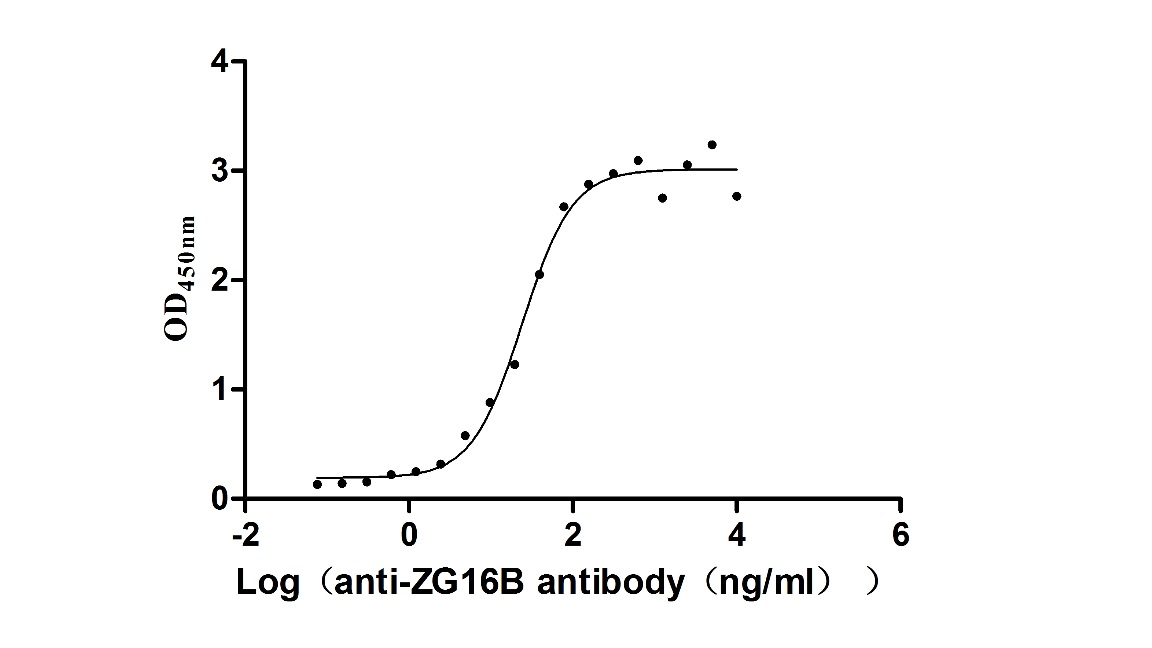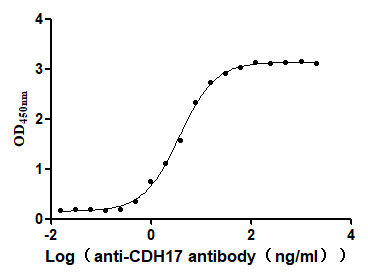Recombinant Mouse Neurogenic differentiation factor 1 (Neurod1)
In Stock-
中文名稱:Recombinant Mouse Neurogenic differentiation factor 1 (Neurod1)
-
貨號:CSB-EP720182MO
-
規(guī)格:¥1536
-
圖片:
-
其他:
產(chǎn)品詳情
-
純度:Greater than 85% as determined by SDS-PAGE.
-
生物活性:Not Test
-
基因名:
-
Uniprot No.:
-
別名:NeuroD1;Beta-cell E-box transcriptional activator 2;Beta2
-
種屬:Mus musculus (Mouse)
-
蛋白長度:Full Length
-
來源:E.coli
-
分子量:47.5 kDa
-
表達(dá)區(qū)域:1-357aa
-
氨基酸序列MTKSYSESGLMGEPQPQGPPSWTDECLSSQDEEHEADKKEDELEAMNAEEDSLRNGGEEEEEDEDLEEEEEEEEEEEDQKPKRRGPKKKKMTKARLERFKLRRMKANARERNRMHGLNAALDNLRKVVPCYSKTQKLSKIETLRLAKNYIWALSEILRSGKSPDLVSFVQTLCKGLSQPTTNLVAGCLQLNPRTFLPEQNPDMPPHLPTASASFPVHPYSYQSPGLPSPPYGTMDSSHVFHVKPPPHAYSAALEPFFESPLTDCTSPSFDGPLSPPLSINGNFSFKHEPSAEFEKNYAFTMHYPAATLAGPQSHGSIFSSGAAAPRCEIPIDNIMSFDSHSHHERVMSAQLNAIFHD
Note: The complete sequence may include tag sequence, target protein sequence, linker sequence and extra sequence that is translated with the protein sequence for the purpose(s) of secretion, stability, solubility, etc.
If the exact amino acid sequence of this recombinant protein is critical to your application, please explicitly request the full and complete sequence of this protein before ordering. -
蛋白標(biāo)簽:N-terminal 10xHis-tagged and C-terminal Myc-tagged
-
產(chǎn)品提供形式:Liquid or Lyophilized powder
Note: We will preferentially ship the format that we have in stock, however, if you have any special requirement for the format, please remark your requirement when placing the order, we will prepare according to your demand. -
緩沖液:If the delivery form is liquid, the default storage buffer is Tris/PBS-based buffer, 5%-50% glycerol. If the delivery form is lyophilized powder, the buffer before lyophilization is Tris/PBS-based buffer, 6% Trehalose, pH 8.0.
-
復(fù)溶:We recommend that this vial be briefly centrifuged prior to opening to bring the contents to the bottom. Please reconstitute protein in deionized sterile water to a concentration of 0.1-1.0 mg/mL.We recommend to add 5-50% of glycerol (final concentration) and aliquot for long-term storage at -20℃/-80℃. Our default final concentration of glycerol is 50%. Customers could use it as reference.
-
儲存條件:Store at -20°C/-80°C upon receipt, aliquoting is necessary for mutiple use. Avoid repeated freeze-thaw cycles.
-
保質(zhì)期:The shelf life is related to many factors, storage state, buffer ingredients, storage temperature and the stability of the protein itself.
Generally, the shelf life of liquid form is 6 months at -20°C/-80°C. The shelf life of lyophilized form is 12 months at -20°C/-80°C. -
貨期:3-7 business days
-
注意事項:Repeated freezing and thawing is not recommended. Store working aliquots at 4℃ for up to one week.
-
Datasheet & COA:Please contact us to get it.
相關(guān)產(chǎn)品
靶點詳情
-
功能:Acts as a transcriptional activator: mediates transcriptional activation by binding to E box-containing promoter consensus core sequences 5'-CANNTG-3'. Associates with the p300/CBP transcription coactivator complex to stimulate transcription of the secretin gene as well as the gene encoding the cyclin-dependent kinase inhibitor CDKN1A. Contributes to the regulation of several cell differentiation pathways, like those that promote the formation of early retinal ganglion cells, inner ear sensory neurons, granule cells forming either the cerebellum or the dentate gyrus cell layer of the hippocampus, endocrine islet cells of the pancreas and enteroendocrine cells of the small intestine. Together with PAX6 or SIX3, is required for the regulation of amacrine cell fate specification. Also required for dendrite morphogenesis and maintenance in the cerebellar cortex. Associates with chromatin to enhancer regulatory elements in genes encoding key transcriptional regulators of neurogenesis.
-
基因功能參考文獻(xiàn):
- that Gas1 is a direct target of NeuroD1 during the induction of the neurogenic program PMID: 29395133
- miR-30a-5p ameliorates inflammatory responses and oxidative stress by targeting Neurod 1 through MAPK/ERK signalling PMID: 28925510
- Retinoid acid (RA) and taurine further improved the differentiation efficiency of iPSCs overexpressing NeuroD1. However, RA and taurine did not promote differentiation in the absence of NeuroD1 overexpression. PMID: 28766169
- Environmental enrichment enhances dorsal-ventral differences in DNA methylation, including at binding sites of the transcription factor NeuroD1, a regulator of adult neurogenesis. PMID: 29352183
- The results of this study reveal essential roles for Neurod1 and Neurod6 in the survival of these neurons during development. PMID: 28130357
- it is suggested that the suppression of NeuroD1 expression and the inhibition of NeuroD1/E-box interaction may play an important role in the Gc-mediated negative regulation of Pomc. PMID: 28406939
- The authors show that NeuroD1 directly binds regulatory elements of neuronal genes that are developmentally silenced by epigenetic mechanisms. PMID: 26516211
- Expression of Transcription Factor NeuroD1 in Olfactory Bulb Glutamatergic Neurons PMID: 26030886
- Data show that RNA binding protein HuD and special adenine-thymine (AT)-rich DNA-binding protein 1 (SATB1) form a positive regulatory loop that enhances NeuroD1 protein transcription and subsequent neuronal differentiation. PMID: 26305964
- Neurod1 regulates the developments of opioid tolerance via a time-dependent pathway through contextual learning and a short-response pathway through antinociception. PMID: 24993058
- The authors report the generation and characterization of Neurod1-CreER(T2) mouse lines and show that Neurod1 is not only expressed in immature newborn neurons of the adult hippocampus but also in fully mature granule cells of the dentate gyrus. PMID: 24913893
- In this study, we tried to establish an effective method of differentiation through the protein transduction of three transcription factors (Pdx1, NeuroD, and MafA) important to pancreatic beta cell development. PMID: 24292793
- NeuroD-dependent neuronal death occurs through a Bax-dependent apoptotic pathway PMID: 23652629
- This study demonistrated that NeuroD modulates opioid agonist-selective regulation of adult neurogenesis and contextual memory extinctionin mice. PMID: 23303051
- Nkx2.2 must repress Neurod1 in a Pdx1+ pancreatic progenitor population to appropriately commit a subset of Neurog3+ endocrine progenitor cells to the alpha cell lineage. PMID: 23408910
- In conclusion, the retina had the highest level of Cerkl mRNA and protein expression, which reached its maximum in the adult retina; and its expression decreased in NeuroD1 knock-out retina. PMID: 23142158
- Atoh7 acts dominantly in Neurod1-expressing retina progenitor cells to activate the retinal ganglion cell genetic program. PMID: 23293286
- The data identify Cx36 as a novel early marker of beta cells and as a target of Beta2/NeuroD1, which is essential for beta-cell development and differentiation. PMID: 22729650
- This study suggested that NeuroD1 may act through Aipl1 and other genes to maintain photoreceptor homeostasis PMID: 22784109
- Combined transfection of the three transcriptional factors, PDX-1, NeuroD1, and MafA, causes differentiation of bone marrow mesenchymal stem cells into insulin-producing cells PMID: 22761608
- NeuroD promoter is substantially more sensitive to the phosphorylation status of Ngn2 than the Delta promoter, and that this can be attributed to differences in the ease of promoter activation. PMID: 22491944
- These results demonstrate that NeuroD1 is an upstream regulator of the NSCL1 gene but not the NSCL2 gene in mice. PMID: 22310718
- NeuroD1 misexpression in the developing mouse cochlea leads to ectopic neuron regeneration. PMID: 20071536
- miR-19b can downregulate insulin 1 expression through targeting transcription factor NeuroD1 PMID: 21781967
- NeuroD1 is expressed in cholinergic and AII amacrine cell types of the retina, among others. PMID: 21593321
- Results suggest that Insm2 plays an important role in the differentiation cascade of Ngn3/NeuroD1 signaling in pancreatic islets. PMID: 21343251
- Findings establish the critical role of the neuronal differentiation factor NeuroD1 in neuroblastoma as well as its functional relationship with the neuronal repellent factor Slit2. PMID: 21349947
- ATF2 interacts with beta-cell-enriched transcription factors, MafA, Pdx1, and beta2, and activates insulin gene transcription. PMID: 21278380
- NeuroD1 expression is reduced in the hippocampus of transgenic R6 mouse models of Huntington's disease (HD PMID: 20807561
- Neurod1 suppresses alternate fates of neurons to differentiate as hair cells and regulates hair cell subtypes. PMID: 20661473
- Neurod1 is not only a major factor for the survival of neurons but is crucial for the development of normal ear connections, both in the ear and in the central nervous system. PMID: 20512592
- The extranuclear ERalpha interacts with the tyrosine kinase Src, which activates extracellular signal-regulated kinases(1/2), to increase nuclear localization and binding to the insulin promoter of the transcription factor NeuroD1. PMID: 20616010
- NeuroD is required for beta cell maturation. PMID: 20374962
- overexpression of NeuroD1 in the periventricular region in vivo leads to the rapid appearance of cells with morphological and molecular characteristics of mature neurons in the subventricular zone and rostral migratory stream PMID: 20080708
- expressional changes in the miR-190 target NeuroD correlated with those in miR-190 expression, suggesting the OPRM1 could regulate the NeuroD pathways via the control of miR-190 expression. PMID: 19854889
- NeuroD are essential, but not sufficient, for amacrine cell genesis. PMID: 11861467
- beta-cell neogenesis in BETA2/NeuroD-deficient mice contributes to their survival PMID: 11875114
- These results suggest that NeuroD is expressed in a mature taste bud cell type, type-II cells, but not in type-III cells. PMID: 11904779
- BETA2/NeuroD induces tissue-specific expression of the SUR1 gene through the E3 element PMID: 11981044
- Loss of BETA2/NeuroD1 in mice results in an age-related retinal degeneration of both rods and cones PMID: 12533605
- ND is the first example of a neuron-specific transcription factor involved in neuronal development and survival whose activity is modulated by huntingtin PMID: 12881483
- NeuroD1/E47 transcription factors up-regulate IA-1 gene expression through the proximal E-box element of the IA-1 promoter PMID: 12890672
- POMC promoter is a point of convergence for independent corticotroph differentiating signals PMID: 14726486
- NeuroD controls both common and distinct sets of molecules involved in cell survival and differentiation in different tissue types [review] PMID: 15650322
- Rb and to a lesser extent p107, but not p130, enhance NeuroD1-dependent transcription PMID: 15701640
- In the present study, we identified Nnat as a target gene of BETA2 in the pancreas. PMID: 15793245
- Eya1 signaling is critical to the normal expression patterns of Tbx1, Ngn1, and NeuroD in the developing mouse otocyst PMID: 15817220
- Analysis of adult transgenic mice revealed that NeuroD1 is predominantly expressed in beta-cells and either absent or expressed below the limit of lacZ detection in mature alpha-, delta-, or PP cells PMID: 15906379
- FoxO1 protects against pancreatic beta cell failure through Neurod and Mafa induction. PMID: 16154098
- Preferential expression of BETA2/NeuroD1 and TrkC in posterior lobes explains the earlier start of cell apoptosis and preferential loss of granule cells in the posterior lobes PMID: 16368089
顯示更多
收起更多
-
亞細(xì)胞定位:Cytoplasm. Nucleus.
-
組織特異性:Expressed in pancreatic beta cells, pulmonary neuroendocrine cells and retinal interneurons amacrine cells (at protein level). Expressed in endocrine cells of the pancreas. Expressed in the inner layer of cerebellar external granular layer (EGL). Expresse
-
數(shù)據(jù)庫鏈接:
Most popular with customers
-
Recombinant Human B- and T-lymphocyte attenuator (BTLA), partial (Active)
Express system: Mammalian cell
Species: Homo sapiens (Human)
-
Recombinant Human G-protein coupled receptor family C group 5 member D (GPRC5D)-VLPs (Active)
Express system: Mammalian cell
Species: Homo sapiens (Human)
-
Recombinant Human Pancreatic adenocarcinoma up-regulated factor (ZG16B) (Active)
Express system: Mammalian cell
Species: Homo sapiens (Human)
-
Recombinant Human Claudin-6 (CLDN6)-VLPs (Active)
Express system: Mammalian cell
Species: Homo sapiens (Human)
-
Recombinant Human V-set and immunoglobulin domain-containing protein 4 (VSIG4), partial (Active)
Express system: Mammalian cell
Species: Homo sapiens (Human)
-
Recombinant Human Interleukin-17A (IL17A) (T26A) (Active)
Express system: Baculovirus
Species: Homo sapiens (Human)
-
Recombinant Macaca fascicularis zymogen granule protein 16 homolog B (ZG16B) (Active)
Express system: Mammalian cell
Species: Macaca fascicularis (Crab-eating macaque) (Cynomolgus monkey)
-
Recombinant Human Cadherin-17 (CDH17), partial (Active)
Express system: Mammalian cell
Species: Homo sapiens (Human)

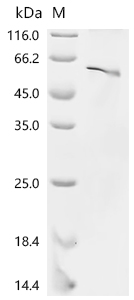

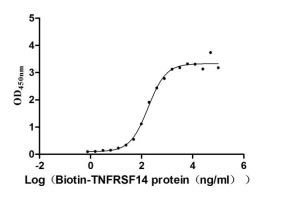
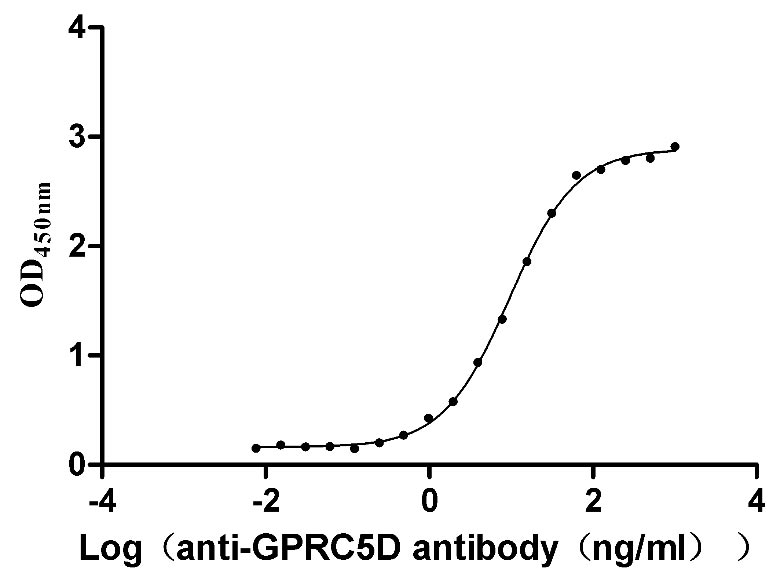
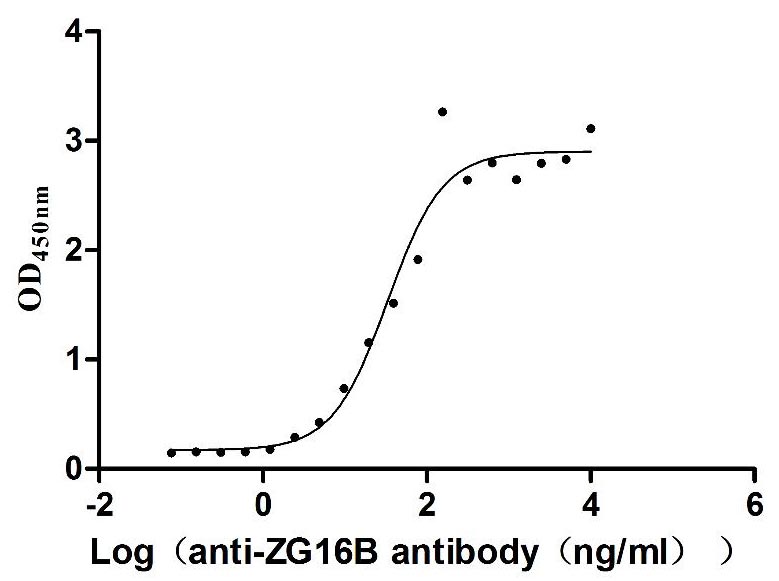
-AC1.jpg)
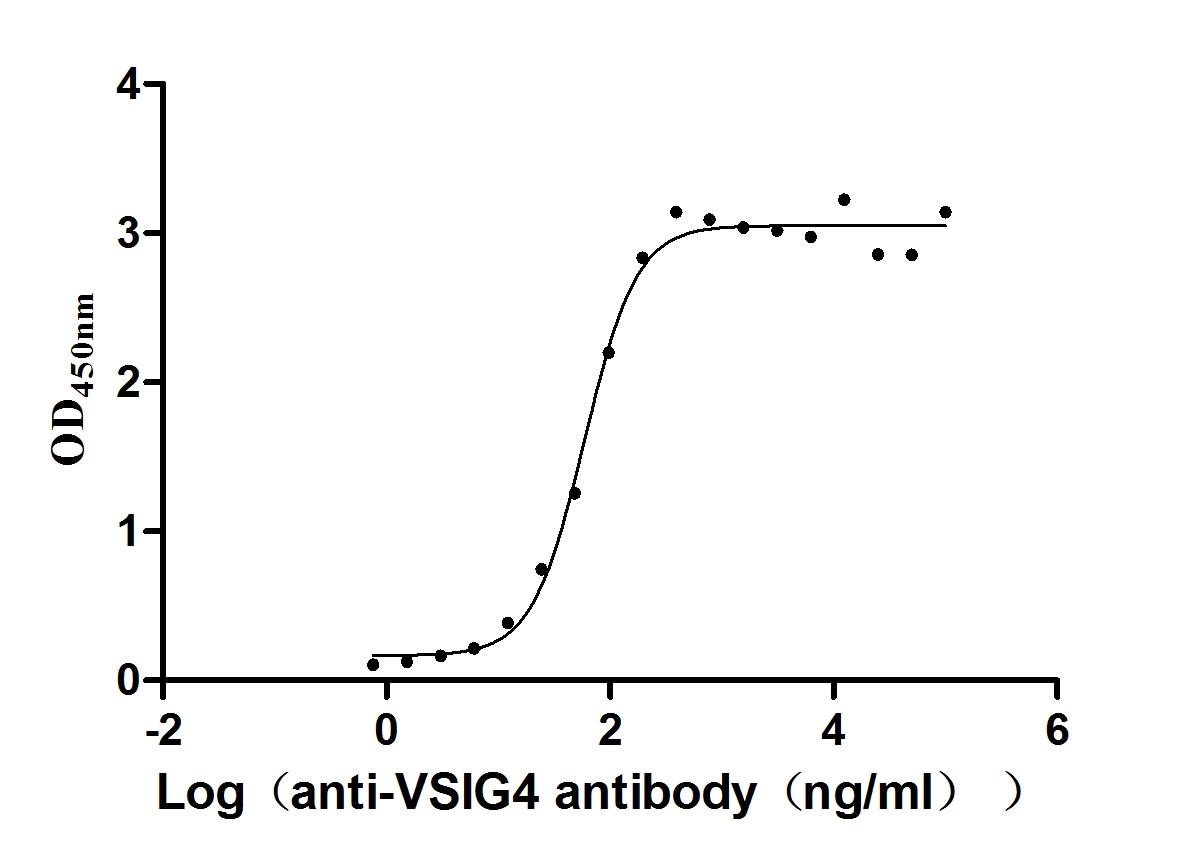
-AC1.jpg)
